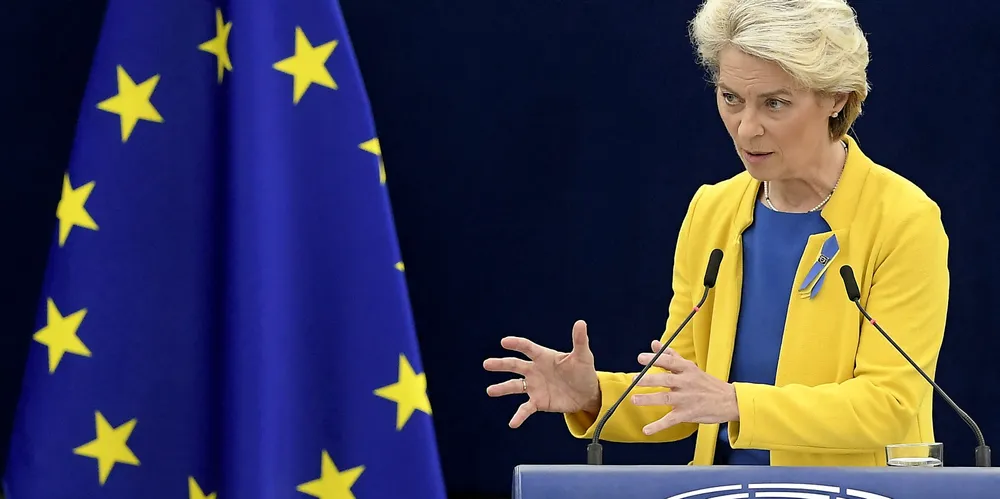EU eyes $140bn windfall from power generators 'to protect citizens from spiking prices'
European Commission plans $180/MWh revenue cap for power generators and 'solidarity contribution' from excessive profits by oil & gas companies

The European Commission has presented more detailed proposals to shield consumers from the adverse effects of spiking energy prices, including a €180 ($179.80) per megawatt hour cap on power price revenues of renewables, nuclear and lignite power producers and a ‘solidarity contribution’ from the oil & gas sector.
The revenue cap and solidarity contribution together would be able to raise more than €140bn ($139.85bn) for EU member states to cushion households and businesses from sky-high prices in the wake of Russian curtailment, European Commission President Ursula von der Leyen said, making clear who caused the current energy crisis.
“This is not only a war unleashed by Russia against Ukraine. This is a war on our energy, a war on our economy, a war on our values and a war on our future,” von der Leyen told the European Parliament in Strasbourg during her State of the European Union speech.
“This costs a lot. But dependency on Russian fossil fuels comes at a much higher price. We have to get rid of this dependency all over Europe.”
The EU since the war on Ukraine started has managed to push down its share of Russian gas from 40% last year to 9% now, but gas prices have also distorted wholesale power markets as due to the ‘merit-order’ principle the most expensive power source defines the price. Recently that has been gas, which pushed power prices (day-ahead futures) to levels around €365/MWh today for Germany on the EEX exchange.
Time-limited interventions
European energy commissioner Kadri Simson said the “emergency proposals” were for “time-limited interventions”.
“We need to take this step to prevent a worsening of the outlook and protect citizens and business from the effects of spiking prices,” Simson said at a press conference in Brussels, adding that the crisis has worsened since July after gas flows from Russia have dropped further.
“The manipulation of supplies is tightening the market and pushing gas prices to new records.”
Patchwork of national price caps?
Industry group WindEurope said it supports the aim of cushioning the impact of high electricity prices on families and businesses, but warned that national caps that deviate from an EU-wide cap would create a patchwork undermining investment in renewables.
Under the proposed package, EU member states would be allowed to maintain already introduced price caps, and the commission would also allow countries willing to go further in limiting revenues of 'infra-marginal' producers of electricity.
“The EU wants a huge expansion of renewables to help get out of the current energy crisis. That means loads of new investments in wind and solar," WindEurope chief executive Giles Dickson said.
"But investors need visibility. So an EU-wide cap on revenues from wind should be precisely that – a single EU-wide cap.
"Allowing countries to deviate from it and have lower caps creates confusion and certainty - and will slow down the investments we so badly need.”
Another measure proposed is a mandatory reduction in electricity consumption during peak hours.
EU energy ministers are slated to discuss the proposals at a second emergency meeting at the end of this month.
Von der Leyen earlier also said that the current electricity market design – based on merit order – is not doing justice to consumers anymore.
“They should reap the benefits of low-cost renewables,” she said.
To de-couple the dominant influence of gas on the price of electricity, the EU commission also plans a deep and comprehensive reform of the electricity market, von der Leyen said, but that reform will come at a later stage and is not part of the emergency measures presented today.
Oil & gas solidarity levy
To redistribute excessive profits from oil & gas companies, the commission also wants to introduce a so-called “solidarity contribution’ to support electricity consumers, based on a complicated calculation.
The levy is to be collected based on 2022 profits. If those are 20% above a company’s average profit of the previous three years, those profits would be taxed at a rate of at least 33%, which would still “leave margin for future investments”, Simson said.
The European Commission is also looking into setting up an alternative gas price benchmark, as it considers the current use of the Dutch TTF Gas Futures price not really representative.